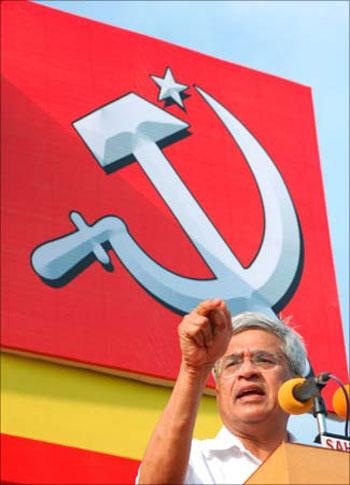
The Communist Party of India convened the inaugural session of the extended meeting of the Central Committee in Vijayawada in Andhra Pradesh, where the CPI(M) took stock of the situation in the country.
In a scathing attack on the United Progressive Alliance government, CPI(M) general secretary Prakash Karat said that the government had failed in all its economic policies and that is why the aam aadmi in the country is suffering. Exceprts from his speech:
Ever rising prices of food and essential commodities burden the people; millions of people go hungry everyday. The inequalities in income and wealth grow sharper and India has the dubious distinction of having some of richest people in the world along with a substantial number of the poorest people in the world.
The Congress-led UPA government boasts about the high growth rate achieved. The GDP growth rate is taken as the reliable index of progress and development for the people. But this is not true. What the neo-liberal policies have led to is the primitive accumulation of capital, the enormous growth of the capital and assets in the hands of a narrow strata. The number of dollar billionaires in India has grown from 9 in 2004 to 49 this year. There has been growth, certainly -- for the super-rich.
The government's policies are designed to help big business make super profits and to enable the transfer of resources to the rich and powerful.
The fiscal and taxation policies of the Congress-led government illustrate this fact starkly.
Click NEXT to read on . . .
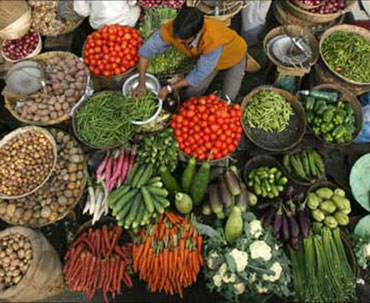
The UPA-II government in the past one and a quarter years since coming to office is pushing for more neo-liberal policies. The government wants to disinvest shares in all profitable public sector units. Earlier, the Left parties had ensured that shares would not be sold of the 'Navaratna' companies. Now everything is up for sale.
Agriculture, which employs half the workforce in the country, is in crisis. Agriculture grew by only 0.2 per cent in 2009-10. Foodgrain production fell by 7.5 per cent the same year. Suicides by farmers have not abated. Land reforms are being reversed. In agriculture, corporatisation is being promoted alongside the withdrawal of State support for the peasantry.
The government proposes to bring in multinational companies into retail trade. The government seeks to push through legislation to FDI in banking and insurance sectors. The working class is under increased attack with labour laws not being implemented and more and more sections being pushed into contract, casual work and into jobs in the informal sector.
The agenda for all these anti-people policies is being propelled by the Indo-US CEO Forum. What the chieftains of big business in US and India proposes, the Manmohan Singh government accepts and implements.
How the government policy is injurious for the people's interests is glaringly illustrated by the relentless price rise of food and other essential commodities. Government policies are directly responsible for the ever-rising prices. Repeated increase in the prices of petroleum products is one major reason.
Forward trading in foodgrains and other essential commodities is another major factor. The government has weakened and curtailed the Public Distribution System through a targeted system which excludes much of the poor. Yet, the government callously and arrogantly refuses to take responsibility.
Click NEXT to read on . . .
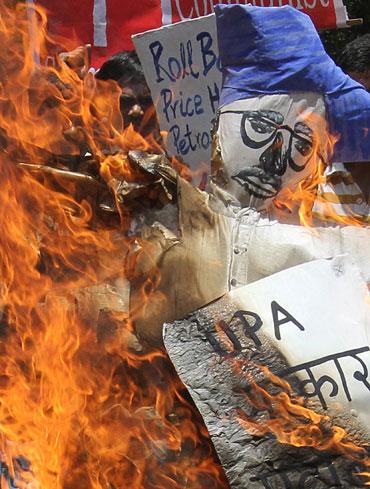
The Congress leadership and the government speak hypocritically about "inclusive growth" when the policies they pursue are designed to exclude the vast majority of the people from access to food, education, jobs and social security. India presents the shameful spectacle of having the world's largest number of hungry and malnutritioned people.
The FCI godowns have 60 million tonnes of foodgrains. Stocks are overflowing and allowed to rot.
We had opposed UPA policies to ensure food security for the people, but this government has ensured food security for rats.
This government no more talks about provision of 6 per cent of the GDP for education and 3 per cent for health. This goal cited in the erstwhile Common Minimum Programme seems more distant than ever.
In the North East, we have seen the ill-effects of the continuous blockade of the highways to Manipur. Even now essential drugs and commodities are not available for the people who are suffering great hardships.
The problems of national unity cannot be solved by the over-centralised approach of the ruling class parties. What is required is the creation of a federal system which accommodates the diverse aspirations of the people of the various regions and nationalities.
Click NEXT to read on . . .

The neo-liberal policies are not only affecting the economic sphere. This is an outlook and philosophy which worships the market and promotes greed and rapacity.
Every institution of the State and every pore of our society is getting polluted and corrupted. The nexus between big business and politics is now out in the open. Public policy making is suborned to serve the interests of a rich and powerful strata. The mining mafia of the Bellary brothers dictates politics in the BJP-ruled Karnataka and also commands influence in the politics of our host state, Andhra Pradesh.
Whether it is the IPL or the telecom scam or the Commonwealth Games, there is no line demarcating public policy and personal enrichment.
Corruption, through the siphoning off of the public funds, preys on the common people who find their rations and other entitlements vanishing into the pockets of a corrupt and greedy nexus of bureaucrats-politicians-contractors.
The corporate media has become the cheer leader for neo-liberal policies.
Such an atmosphere has begun to corrode the parliamentary democratic system itself. The people's right to assemble, to organise and to protest is being severely restricted by administrative and judicial actions.
Click NEXT to read on . . .
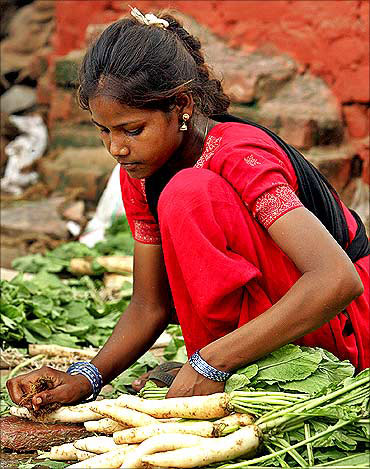
Trade unions are not allowed to function in Special Economic Zones and many other enterprises; peasants face police repression if they protests against the lands being taken away; and student unions and organisations are banned in many educational institutions.
This is the path the ruling classes have adopted which is in alignment with their alliance with the United States of America. For the Manmohan Singh government (and earlier, the BJP-led government too), there are two essential friends for India -- the USA and Israel.
There are no second thoughts on compromising national sovereignty and even the lives and safety of the people in order to fructify this alliance. As part of the commitment made in the Indo-US nuclear deal, the government has brought a legislation in Parliament which embodies this subservience.
After the worst industrial accident in the history of the world in Bhopal, in which the victims got no justice and the perpetrator of the crime -- the American multinational -- was let off, the government now proposes a law which will make any American company which supplies nuclear reactors to India not liable for even one rupee if there is a nuclear accident.
The three Left-led governments of West Bengal, Kerala and Tripura have always striven to put in place pro-people policies. It is these three governments which have implemented land reform to the maximum in the country.
It is these three governments which have sought to expand the areas of relief and welfare for the unemployed and the poor. All three governments have introduced urban employment guarantee schemes within the constraints of resources. It is these three governments which have adhered firmly to the secular principle and given no quarter to the communal forces.
Click NEXT to read on . . .
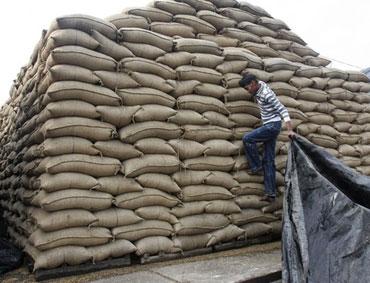
The defence of the Left-led governments is an important task for all the Left and democratic forces in the country.
On the economic front, the first and foremost task is to tackle the agrarian crisis. Instead of moving towards corporatisation of agriculture, the farmers are to be assured of inputs at reasonable prices, so that agriculture can be sustainable. The goal of ensuring food security requires that farmers be given sufficient incentives to produce more.
There has to be a universal Public Distribution System with adequate procurement to ensure that hunger and malnutrition are eliminated. The public sector should play a key role in the strategic sectors of the economy including the financial sector. Labour intensive industries should be encouraged, so that more employment is created.
Speculative capital flows must be regulated and profits from such foreign institutional investment taxed. Steps should be taken to recover the illegal money kept in tax havens and secret bank accounts. The corporates and the affluent should pay more taxes.
It is with the increased tax revenues that there can be increased public expenditure on education, health and social welfare.
The rights of the tribal people over their own lands must be ensured by the implementation of the Forest Rights Act and protection of their rights by stopping large-scale, indiscriminate and illegal mining. The scourge of corruption in public life and in State institutions must be tackled by starting at the top.
On global warming and the steps to protect the world environment, India has to take a firm stand to ensure that the advanced countries discharge their responsibilities to cut emissions and to help the developing countries adopt environmental friendly technologies.